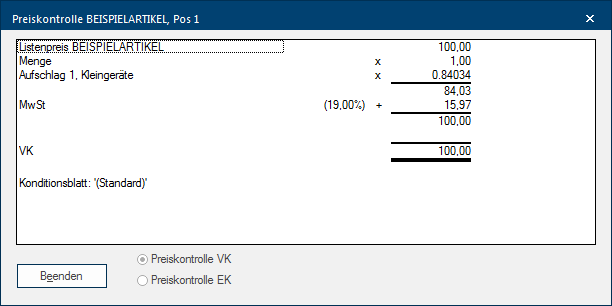Recommended Retail Price (gross)
When a recommended retail price including value added Addition (in Latin: addere) is one of four basic operations in arithmetic. In primary school and in common language it is the expression used for the adding of two or more numbers. tax is stored as a list price The list price in CARAT designates the price that was deposited by the manufacturer in the CARAT catalogue data. in the catalogue data, in other words a gross selling price, you would normally want to apply this price unchanged in your quote.
- To do this, you should first set the base to list price and activate the checkbox A checkbox is a standard element in a graphic user interface. A checkbox has, in most cases, two states (set or not set). These usually correspond to a yes/no selection. for value added tax. Thus, you can now enter a gross-surcharge, that already considers the value added tax, by entering a factor of 1,0000.
The following graphic should clarify calculation method in CARAT. Independent of the fact that you have entered a surcharge factor including value added tax, CARAT multiplies Multiplication (from Latin: multiplicare = multiply, also know as times) is one of four basic operations in arithmetic. the list price with the net factor and adds subsequently the value added tax assigned to the respective article. This approach is necessary so that different VAT rates can be used.

The price control is available on the index card Some dialogue windows are too voluminous, therefore the functions are separated into indexed groups. The subgroup names typically appear on the tab of the index card at the top of the dialogue and can be selected by clicking on the appropriate tab. Planning comm. in the menu ribbon. You can call up the price control as soon as you have marked an article in the parts list, and thus see the price calculation of CARAT for an article at any time.
- See also: The Price control




